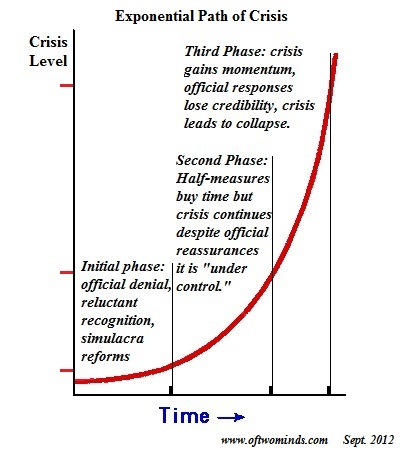Only in crisis do human beings actually change anything.
If there is any demarcation with profound implications going forward, it isn't the line between the 1% and the 99% or the line dividing the Status Quo into two safely complicit ideological camps: it is the divide between those who squarely face the burden of knowing the present is unsustainable and those who flee into the comforts of denial. Those who accept the burden of knowing are part of the solution, those who cling to denial are part of the problem.
Those who accept the burden of knowing do not necessarily have answers, but they are alert to alternatives and potential solutions. Those in denial can only hope that reality can be buried for a while longer.
Thus we have pronouncements that "the euro is irreversible," that progress is being made, and so on. Nothing has been fixed, but those clinging to denial are comforted that crisis has been pushed forward once again.
Pushing problems under the rug doesn't solve them; they only get worse. This is the positive power of crisis: only in crisis do human beings actually change.
As long as "enablers" are around to protect them from the consequences of their actions and choices, addicts are free to pursue their destructive (to themselves and others) ways. The addicts can be sociopaths or they can be "normal;" the unifying characteristic is their terror in facing the end of the Status Quo, even when the Status Quo is patently destructive and unsustainable.
In the Status Quo, the "enablers" include everyone who gains if the Status Quo continues unchanged, as they are hoping to collect their share of the unpayable promises that have been issued to buy political support or silence, i.e. complicity.
The "handlers and enforcers" of the neofeudal Status Quo--the political and financial Elites and their Upper Caste of managers and apparatchiks--are consciously shoving problems under the rug, in the hopes that some sort of unknown magic will restore the elixir of "growth" that has reliably bailed out the corrupt, increasingly fragile skimming operation (the Status Quo).
The Internet boom bailed it out in the 1990s, and the global housing bubble bailed it out in the 2000s. Now the skimming operation has run out of miracles, and its true nature--it is fundamentally a cargo-cult--has been revealed. Central bankers and their political toadies are in effect praying for a miraculous return of prosperity by painting radio dials on rocks and dancing around the campfire late at night.
The process of shoving structural problems under the rug takes two forms: one is to manipulate data and news flow to "manage perceptions" that all is well, that the Elites have the will and power to force the system back to "set point." The Machine's visible failure to do so after four years of ceaseless "fixes," stopgaps, reassurances, pronouncements and increases in complexity suggests not that it has the power to do so, but that it has lost the ability to repair the boilers with policy/intervention duct-tape.
The other is propaganda: announcing that the latest "fix" will do the trick, or more perniciously, that the present crisis is not an "unrecognized Depression" but merely another "business cycle" recession. Human habituate rather quickly to a range of "normal," and so the substitution of manipulation for accountability becomes "normal" over time.
The "new normal" isn't just a decline in purchasing power and employment; it is the slow loss of institutional legitimacy as the lies and obfuscations pile up.
But since the underlying dynamics are continuing to expand, masking the problems only increases the fragility and vulnerability of the system as the extremes are pushed ever farther out the curve.
For example: if too much leverage is the problem, the Status Quo solution is to increase leverage and hide the increase in opaque derivatives, offshore banking accounts and "dark pool" trading.
Now that collateral has vanished, the leverage in the system is near-infinite. The Status Quo "solution" is to issue new phantom assets to replace the assets which have become recognized as illusory.
How many iterations of the game can be run before some non-linear second-order effect causes the sandpile to collapse?
Rather than fear the crisis, we should embrace it, for it is only in crisis, when all the lies, half-measures, excuses and backstops have broken down, is positive transformation possible.
This essay was drawn from Musings Report 36. The Reports are sent weekly to subscribers and major contributors.
My apologies for the lack of email response. I was on the road and have only been able to respond to 10% of my correspondence. Your understanding of my limits is greatly appreciated.
 Resistance, Revolution, Liberation: A Model for Positive Change (print $25)
Resistance, Revolution, Liberation: A Model for Positive Change (print $25)
(Kindle eBook $9.95)
We are like passengers on the Titanic ten minutes after its fatal encounter with the iceberg: though our financial system seems unsinkable, its reliance on debt and financialization has already doomed it.We cannot know when the Central State and financial system will destabilize, we only know they will destabilize. We cannot know which of the State’s fast-rising debts and obligations will be renounced; we only know they will be renounced in one fashion or another.
The process of the unsustainable collapsing and a new, more sustainable model emerging is called revolution.Rather than being powerless, we hold the fundamental building blocks of power. We need neither permission nor political change to liberate ourselves. A powerless individual becomes powerful when he renounces the lies and complicity that enable the doomed Status Quo’s dominance.
| Thank you, John R. ($10/mo), for your astoundingly generous subscription to this site--I am greatly honored by your support and readership. |

 Resistance, Revolution, Liberation: A Model for Positive Change (print $25)
Resistance, Revolution, Liberation: A Model for Positive Change (print $25)


























